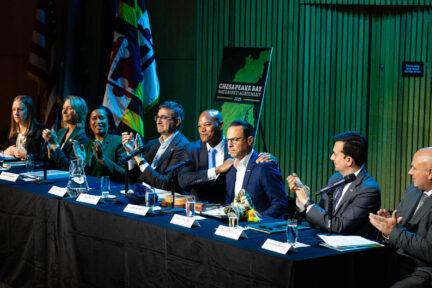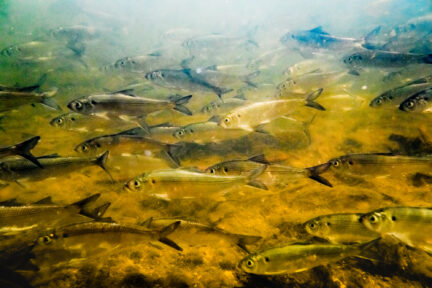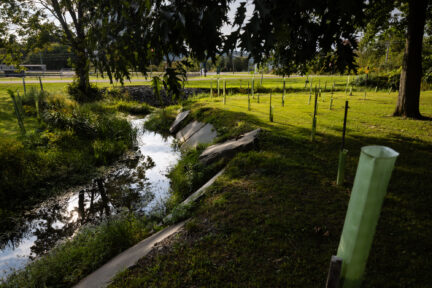Chesapeake Bay Program office funding helps watershed non-profits weather pandemic
Chesapeake Bay Program Office Funding Helps Watershed Non-Profits Weather Pandemic
The Chesapeake Bay Program, in partnership with the Chesapeake Bay Trust, is pleased to announce the completion of all projects funded under the “Equity and Environmental Education in the time of Coronavirus Disease 2019 (COVID-19) to Support Environmental Education Providers” grant program.
In fall 2020, non-profit organizations experienced in providing environmental education throughout the Chesapeake Bay watershed were invited to apply for emergency funding to help offset the hardships caused by the COVID-19 pandemic. Funding for this grant program came from the Environmental Protection Agency’s Chesapeake Bay Program Office and was administrated by the Chesapeake Bay Trust. In total, the nine recipients received $159,400 for use toward the implementation of their programs by the end of 2021.
"These funds supported the environmental education community during a challenging and uncertain time," said Shannon Sprague, environmental literacy and partnerships manager for the National Oceanic and Atmospheric Administration Chesapeake Bay Office and co-chair of the Chesapeake Bay Program Education Workgroup. "As opportunities to work with students in-person changed, our partners showed tremendous creativity and innovation to ensure that students in our region were still able to safely participate in engaging environmental education. Many of the products and innovations developed with this funding will continue to enhance our work after we return to pre-pandemic operations."
Grant recipients included:
- Annapolis Maritime Museum and Park received $20,000 to support the adaption and implementation of the Box of Rain and School in Nature programs.
- Blue Sky Fund used $20,000 to support the adaptation and implementation of the Explorers program for third, fourth and fifth graders at Richmond Public Schools.
- Boxerwood Education Association received $19,990 to support the NEST program for students in Rockbridge County, Virginia.
- ECO City Farms used $20,000 to support the transition of education offerings to a virtual format and provide at-home COVID testing kits to 3,000 Prince George’s County, Maryland students.
- Friends of Peirce Mill received $7,200 to support an online program for third graders in the District of Columbia that included live lessons and a virtual field trip.
- Friends of the National Arboretum used $19,985 to support the distribution of Grow-at-Home kits for 2,000 students and six safely-distanced Arboretum Family Days at the U.S. National Arboretum for high-needs school communities.
- Living Classroom Foundation received $19,998 to support the adaptation and implementation of a virtual School Leadership in Urban Runoff Reduction Project (SLURRP) program for fourth and fifth graders in South Baltimore, Maryland.
- Stroud Water Research Center used $14,442 to support the adaptation and implementation of virtual environmental education programs and created a Pennsylvania Watershed Literacy and Resources website.
- Ward Foundation received $17,785 to enable the Ward Museum to continue serving regional children and teachers through new socially-distant, virtual and hybrid programs.
The Annapolis Maritime Museum was one of these lucky recipients. Sarah Krizek, volunteer coordinator, thankfully noted that they were able to obtain their childcare license and offer a “School in Nature” opportunity for working families, which was sorely needed. She added, “children were offered a structured work environment to conduct their classes and an abundance of outdoor activities and adventures to counter all the screen time.”
“The Trust is proud to partner with the Environmental Protection Agency’s Chesapeake Bay Program Office to distribute resources for these projects that engage students and make a difference in our schools, communities and environment,” said Dr. Jana Davis, president of the Chesapeake Bay Trust. “We know that meaningful environmental education lays the foundation for future restoration and protection of our local natural resources. These innovative programs have been essential to furthering that education for students during the pandemic.”
About the Chesapeake Bay Program
The Chesapeake Bay Program (www.chesapeakebay.net) is a regional partnership that has coordinated and conducted the restoration of the Chesapeake Bay since its formation in 1983. Partners include the U.S. Environmental Protection Agency, representing the federal government; the states of Delaware, Maryland, New York, Pennsylvania, Virginia and West Virginia; the District of Columbia; the Chesapeake Bay Commission, a tristate legislative body; and advisory groups of residents, scientists and local government officials.
About the Chesapeake Bay Trust
The Chesapeake Bay Trust (www.cbtrust.org) is a nonprofit, grant-making organization established by the Maryland General Assembly dedicated to improving the natural resources of Maryland and the Chesapeake region through environmental education, community engagement and local watershed education. The Trust’s grantees engage hundreds of thousands of individuals annually in projects that have a measurable impact on the waterways and other natural resources of the region. The Trust is supported by the sale of the Treasure the Chesapeake license plate; donations to the Chesapeake Bay and Endangered Species Fund on the Maryland State income tax form; donations made by hunters, fishers and boaters in the Maryland online natural resource licensing system; donations from individuals and corporations; and partnerships with private foundations and federal, state and local governments. The Trust has received the highest rating from Charity Navigator for over two decades: On average, 90% of the Trust’s expenditures are directed to its restoration and education programs.



